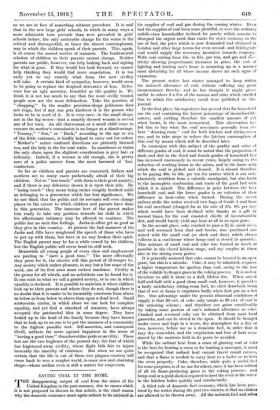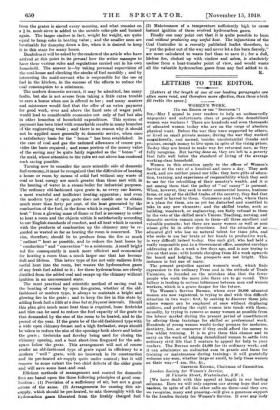SAVING COAL IN THE HOME.
THE disappointing output of coal from the mines of the United Kingdom in the past summer, due to causes which it is not proposed to discuss in this article, is the chief reason why the domestic eonsumer must again submit to be rationed in
his supplies of coal and gas during the coming winter. Even had the supplies of coal been more plentiful, or were the ordinary middle-class householder inclined for purely selfish reasons to disregard the urgent need that exists for strict economy in the use of fuel, the price which is now demanded and obtained in London and other large towns for even second- and third-grade coal would supply the necessary incentive towards economy. With coal costing from 45s. to 65s. per ton, and gas and elee- tricity showing proportionate increases in price, the cost of lighting and heating one's home is mounting up in a manner most disturbing for all whose income shows no such signs of expansion.
The present writer last winter managed to keep within his rationed allowance of coal, without suffering any great inconvenience thereby, and he has thought it might prove useful to others if a few of the axioms and rules which enabled him to attain this satisfactory result were published in thil journal.
In the first place, his experience has proved that for househol I use the coal containing the lowest percentage of incombustibh matter, and yielding therefore the smallest amount of ash when burnt, is the most economical. This observation les! led him to buy what the coal merchants generally term the best " drawing-room " coal for both kitchen and sitting-room use, and to take steps to reduce the kitchen consumption of this coal by means which will be described later.
In connexion with this subject of the quality and value of different grades of coal, it must be noted that the proportion el shale and dirt in the third and fourth grades of household fuel has increased enormously in recent years, largely owing to the reduction of working hours in the mines, and to the haste with which the coal is picked and cleaned. It is absurd therefore to be paying 40s. to 50s. per ton for matter which is not only absolutely worthless from a calorific standpoint, but also leads to the incomplete combustion and waste of the good fuel with which it is mixed. The difference in price between the best household coal and the lower grades is no criterion of their difference in heat-value when burned. During the recent railway strike the writer received two bags of Grade 4 coal from his coal merchant (charged for at the rate of 47s. 6d. per ton; which would have been declined with thanks as a gift is normal times, for the coal consisted chiefly of incombustible dirt, and would barely yield any heat at all in an open grate.
In the second place, coke crushed to pass a 2l. in. mesh sieve, and well screened from dust and breeze, was purchased and mixed with the small coal (or slack and dust) which alwaye collects in a coal-house where lump coal is stored in quantity. This mixture of small coal and coke was burned as much as possible in the closed kitchen range, and any surplus at times also in the sitting-room grates.
It is generally assumed that coke cannot be burned in an open grate, but this is a mistake. Coke, it may be admitted, requires a higher temperature for ignition than coal, owing to the loss of the volatile hydrogen gases in the coking process. It is useless therefore to add it alone to a dull, lifeless fire. When mixed half-and-half with a good clean small coal, however, it provides a fairly satisfactory sitting-room fuel, its chief drawback being that if wet or damp it crepitates badly when first put on a hot fire. One advantage under the present abnormal conditions el supply is that 30 cwt. of coke only counts as 20 cwt. of coal in the rationing scheme ; and therefore one gains considerably by taking some portion of one's rationed allowance as coke. Crushed and screened coke can be obtained from most local gasworks, and can be stored in the open. It should be brought under cover and kept in a warm, dry atmosphere for a day or two, however, before use as a domestic fuel, in order that it may dry somewhat, and the crepitation and loss of heat occa- sioned by the moisture held in its pores be avoided.
While the radiant heat from a mass of glowing coal or coke is the best for heating a room or for heating a saucepan, it must be recognized that radiant heat cannot travel round corners, and that a flame is needed to carry heat to a boiler or to heat the oven properly. Coke, therefore, while quite a useful fuel for some purposes, is of no use for others, since it has been robbed of all its flame-producing gases in the coking process ; and lump coal or a good slack is required to heat the oven or the water in the kitchen boiler quickly and satisfactorily.
A third rule of domestic fuel economy, Which has been prac- tised by the writer during the past two winters, is that no cinders are allowed to be thrown away. All the unburnt fuel and oleo from the grates is sieved every morning, and what remains on a I in. mesh sieve is added to the outside coke-pile and burned again. The larger cinders in fast, weight for weight, are quite equal to lump coke in heating value ; and the smaller ones are invaluable for damping down a fire, when it is desired to keep it in this state for many hours.
Doubtless it will be asked by the readers of the article who have arrived at this point in its perusal how the writer manages to have these various rules and regulations carried out in his own household. The answer is—by taking personal supervision of the coal-house and checking the stocks of fuel monthly ; and by interesting the maid-servant who is responsible for the use of fuel in the kitchen, in the suoceas of the efforts to reduce the coal consumption to a minimum.
The modern domestic servant, it may be admitted, has many faults, but she is not averse from taking a little extra trouble to earn a bonus when one is offered to her ; and many masters and mistresses would find that the offer of an extra payment for good work, over and above the fixed rate of wages paid, would lead to considerable economies not only of fuel but also in other branches of household expenditure. This system of payment has been tried with remarkable results in many branches of the engineering trade ; and there is no reason why it should not be applied more generally to domestic service, when once a satisfactory basis for the "bonus" has been established. In the case of coal and gas the rationed allowance of course pro- vides the basis required ; and some portion of the money value of the saving may be quite fairly regarded as the " bonus " of the maid, whose attention to the rules set out above has rendered such saving possible.
Turning now to consider the more scientific side of domestic fuel economy, it must be recognized that the difficulties of heating a house or room by means of solid fuel without any waste of coal or heat energy are much greater than those met with in the heating of water in a steam-boiler for industrial purposes. The ordinary old-fashioned open grate is, as every one knows, a most wasteful and inefficient heating apparatus ; and even the modem type of open grate does not enable one to obtain much more than forty per cent. of the heat generated by the combustion of the fuel, in the form which is required. "Radiant heat" from a glowing mass of flame or fuel is necessary in order to heat a room and the objects within it satisfactorily according to our English standards of comfort, and all heat which is carried with the products of combustion up the chimney may be re- garded as wasted so far as heating the room is concerned. The aim, therefore, should be to produce from the fire as much "
radiant" heat as possible, and to reduce the heat losses by "conduction" and " convection " to a minimum. A small bright red fire consequently is much more efficient and economical for heating a room than a much larger one that has become dull and lifeless. This latter type of fire not only radiates little useful heat into the room, but wastes the hydrocarbon gases of any fresh fuel added to it ; for these hydrocarbons are slowly distilled from the added coal and escape up the chimney without ignition in an =consumed state.
The most practical and scientific method of saving coal in the heating of rooms by open fire-grates, whether of the old- fashioned or modem type, is always to maintain a bright and glowing fire in the grate ; and to keep the fire in this state by adding fresh fuel a little at a time but at frequent intervals. Should this plan give much more heat than is required, loose firebricks and tiles can be used to reduce the fuel capacity of the grate to that demanded by the size of the room to be heated, and to the period of the year. If the grate be of the old-fashioned type with a wide open chimney-breast and a high firebasket, steps should be taken to reduce the size of the openings both above and below the grate ; firebricks and fireelay being used for closing the chimney opening, and a bent sheet-iron fireguard for the ash- space below the grate. This arrangement will not of course render an old-fashioned type of grate equal in efficiency to a modem " well " grate, with no ironwork in its construction and its pre-heated air-supply quite under control ; but it will remove to some extent the two chief defects of the older grate and will save some heat, and coal.
Efficient methods of management and control for domestic fires are based upon the three following principles of good corn bastion: (1) Provision of a sufficiency of air, but not a great excess of the same. (2) Arrangements for causing this air- Isupply, which should be pre-heated, to mix thoroughly with the hydrocarbon gases liberated from the freshly charged fuel
(3) Maintenance of a temperature 'sufficiently high to cause instant ignition of these evolved hydrocarbon gases.
Finally one may point out that it is quite possible to burn coal without producing any useful heat. The injunctions of the Coal Controller in a recently published leaflet therefore, to "put the poker out of the way and never let a fire burn fiercely," are more calculated to waste fuel than to save it ; for a dull, lifeless fire, cheked up with cinders and ashes, is absolutely useless from a heat-transfer point of view, and would waste all the valuable hydrocarbon gases from any fuel added to it.
K.







































 Previous page
Previous page